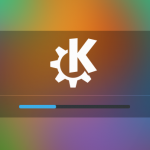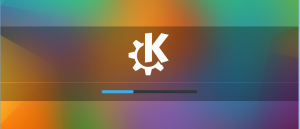 It’s october, the leaves are falling, we had our first frost this week… and here is yet another KDE 5 release for Slackware to keep you warm and cozy. I am happy with my KDE 5_15.10 update. Again I waited until every KDE source was refreshed: this set contains Frameworks 5.15.0, Plasma 5.4.2 and Applications 15.08.2.
It’s october, the leaves are falling, we had our first frost this week… and here is yet another KDE 5 release for Slackware to keep you warm and cozy. I am happy with my KDE 5_15.10 update. Again I waited until every KDE source was refreshed: this set contains Frameworks 5.15.0, Plasma 5.4.2 and Applications 15.08.2.
And you know what? The “progress bar issue” which has plagued me ever since the first Plasma 5.4 release could finally be resolved, thanks to Gérard Monpontet who posted the solution in the comments section of previous Plasma 5 blog post. I love it when the Slackware community helps fixing issues well before they start bothering Pat. Apparently, desktop sessions not only need to be started using a ConsoleKit process but also using a DBus invocation.

But that’s not all; there is a bit more to tell about the October release.
What’s new in KDE 5_15.10?
- Frameworks 5.15.0 is an enhancement release with no new Frameworks added. You can read the details on https://www.kde.org/announcements/kde-frameworks-5.15.0.php
- Plasma 5.4.2 is a bugfix release and perhaps the last before 5.5.0, because 5.4.3 will only be released if there’s a need for it. See https://www.kde.org/announcements/plasma-5.4.2.php . New this month is that I enabled the compilation of the “plasma-mediacenter” application, which you may or may not like, but at least you can check it out now.
- Applications 15.08.2 was just released today. It is a bugfix release – but for Slackware it means the sudden appearance of a lot more packages. Because:
- I have finally enabled KDE Telepathy in my KDE.SlackBuild framework. That’s 14 new packages for you! Only the voice & video GUI is still missing, the KDE Telepathy developers are looking for someone knowledgeable to port the old KDE 4 version to Frameworks 5.
And to support building them, I had to add yet another 18 packages in the “deps” section. You will find those dependencies all self-contained in a single “telepathy” subdirectory right below “deps”. That way, if you don’t care much for Telepathy you can easily skip these packages. Similarly, the new KDE Telepathy packages are all located in a subdirectory “telepathy” below “kde”. The full list of new Telepathy dependencies is : libotr, libnice, farstream, libaccounts-glib, libaccounts-qt5, signon, signon-plugin-oauth2, signon-ui, libsignon-glib, telepathy-glib, telepathy-farstream, telepathy-haze, telepathy-gabble, telepathy-qt5, telepathy-logger, telepathy-logger-qt5, telepathy-mission-control and telepathy-accounts-signon.
- I added a new package to “plasma-extra” because I did not want to wait for Plasma 5.5 where this program will likely be included by default. It is called “xembed-sni-proxy” and on startup (automatically when you launch a Plasma 5 desktop session) it will dock into the Plasma system tray area and start listening for XEmbed requests. Tray icons for applications adhering to the “legacy” XEmbed protocol will be displayed seamlessly inside the Plasma tray area, courtesy of xembed-sni-proxy). There is no longer a need for external tray applications like trayer-srg or stalonetray.
Here is a screenshot which shows the (XEmbed) HP system tray icon – snugly placed inside the xembed-sni-proxy tray area. You’ll also notice the reddish avatar at the left – that is KDE Telepathy, its color informing me that it is does not have any account configured yet.

Installing or upgrading Frameworks 5, Plasma 5 and Applications
The remainder of the article is mostly a re-hash, but I include it every time so that you do not have to search through this blog, and have everything together on a single page.
As always, the accompanying README file contains full installation & upgrade instructions. Note that the packages are available in several subdirectories below “kde”, instead of directly in “kde”. This makes it easier for me to do partial updates of packages. The subdirectories are “kde4”, “kde4-extragear”, “frameworks”, “kdepim”, “plasma”, “plasma-extra”, “applications” and “telepathy”.
Upgrading to this KDE 5 is not difficult, especially if you already are running KDE 5_15.09_02. You will have to remove old KDE 4 packages manually. If you do not have KDE 4 installed at all, you will have to install some of Slackware’s own KDE 4 packages manually.
Note:
If you are using slackpkg+, have already moved to KDE 5_15.09_02 and are adventurous, you can try upgrading using the following set of commands. This should work but feel free to send me improved instructions if needed (assuming in this example that you tagged my KDE 5 repository with the name “ktown_testing” in the configuration file “/etc/slackpkg/slackpkgplus.conf“):
# slackpkg update
# slackpkg install ktown_testing (to get the newly added packages from my repo)
# slackpkg install-new (to get the new official Slackware packages that were part of my deps previously)
# slackpkg upgrade ktown_testing (upgrade all existing packages to their latest versions)
# slackpkg upgrade-all (upgrade the remaining dependencies that were part of my repo previously)
And doublecheck that you have not inadvertently blacklisted my packages in “/etc/slackpkg/blacklist“! Check for the existence of a line in that blacklist file that looks like “[0-9]+alien” and remove it if you find it!
Recommended reading material
There have been several posts now about KDE 5 for Slackware-current. All of them contain useful information, tips and gotchas that I do not want to repeat here, but if you want to read them, here they are: http://alien.slackbook.org/blog/tag/kde5/
A note on Frameworks
The KDE Frameworks are extensions on top of Qt 5.x and their usability is not limited to the KDE Software Collection. There are other projects which rely (in part) on the KDE Frameworks, and if you are looking for a proper Frameworks repository which is compatible with Slackware package managers such as slackpkg+, then you can use these URL’s to assure yourself of the latest Frameworks packages for Slackware-current (indeed, this is a sub-tree of my KDE 5 “testing” repository):
Where to get the new packages for Plasma 5
Download locations are listed below (you will find the sources in ./source/5/ and packages in /current/5/ subdirectories). If you are interested in the development of KDE 5 for Slackware, you can peek at my git repository too.
Using a mirror is preferred because you get more bandwidth from a mirror and it’s friendlier to the owners of the master server!
Have fun! Eric





Recent comments